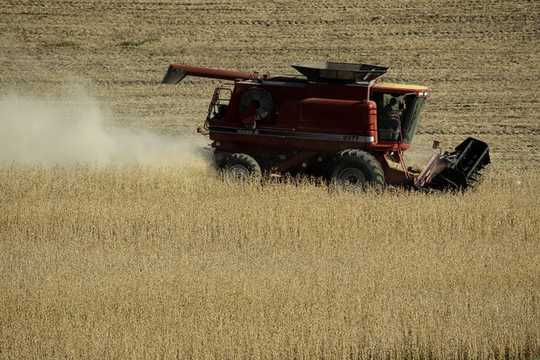
It’s harvest time. AP Photo/Charlie Riedel
America’s farmers have borne the brunt of China’s retaliation in the trade war that President Donald Trump launched in 2018.
One reason: China is the biggest buyer of many U.S. agricultural products, such as soybeans, grain sorghum, cotton and cattle hides, which made these products an obvious target for retaliatory tariffs.
The other related reason is more strategic: China hoped inflicting economic costs on U.S. farmers – who voted overwhelmingly for Trump in 2016 – would in turn put pressure on the president to end his trade war.
Although farmers have lost billions of dollars in exports, China’s strategy hasn’t created the intended effect, with surveys of farmers continuing to show strong support for the president.
We conducted our own survey of corn and soybean farmers. Published in October 2019, it suggests three reasons farmers support Trump’s trade policies despite the costs.
Easing the pain
Undoubtedly, China’s retaliatory tariffs on almost all U.S. agricultural exports, most notably soybeans, feed grains and pork products, have been painful for farmers.
China bought anywhere from US$20 billion to $26 billion worth of U.S. agricultural products a year from 2012 to 2017. Chinese purchases plunged to $9.2 billion in 2018 and are on a slightly higher pace so far this year. Soybean exports alone fell 75% from 2017 to 2018.
Over 80% of the 693 Iowa, Illinois and Minnesota farmers we surveyed from February through June said trade disruptions had an adverse effect on their net farm income in 2018. Almost a third reported that their income dropped by over 20%.
But the Trump administration’s efforts to ease their pain have paid off. The administration gave soybean, sorghum and other farmers $12 billion in assistance in 2018, which the vast majority of our survey participants found useful. The survey was conducted before an additional $16 billion in payments went to farmers this year, both to offset trade losses as well as the effects of too much rain.
Long-term gains
We also found that farmers largely view the trade disruption as short-term pain for long-term gain.
While only 14% think their farm operations will be better off financially a year from now, more than half said they expected something good to ultimately come out of the trade war. And about 44% said they believe the U.S. economy will be stronger in three years. China’s 2017 decision to allow imports of U.S. beef and its 2020 national ethanol mandate also give farmers hope for new export opportunities.
In other words, most farmers are prepared to sacrifice income for a while on the belief they’ll make up for it down the road. Since agriculture is a highly cyclical industry, this sanguine view is understandable.
In fact, U.S. agricultural exports to China this year rebounded a bit compared with a year ago, thanks to China’s recent exemptions of tariffs on U.S. soybeans and pork products.
Frustration with China
Finally, we found a growing frustration with China’s erratic buying behavior.
For example, China shut out U.S. beef for 14 years over a mad cow scare in 2003, keeping the ban more than a decade after other countries like Japan and South Korea lifted theirs.
Chinese purchase of products such as distillers grains or corn sometimes just disappear. These may have been offshoots of adjustments China made to its corn support policy, but, from the perspective of U.S. farmers, Chinese demand for certain U.S. agricultural commodities has been annoyingly inconsistent.
Although we didn’t ask survey participants a specific question on this topic, many farmers provided their own unsolicited comments that voiced this frustration.
“The Chinese do not play by the rules,” one Illinois farmer said. “They cancel shipment orders that are not in their favor. They continue to steal our patents. Only President Trump has tried to stop these unfair trade practices.”
Or as a farmer from Minnesota explained: “China imposed the tariffs and refused to buy soybeans in an attempt to hurt our agriculture and get us to turn against a president they do not want. They have been stealing technology and jobs for too long and giving us back inferior goods. Prior to this, they manipulated our markets by buying and then canceling or refusing shipments of grain.”
The possibility of relief
Our survey showed that most farmers recognize that they will continue to be the biggest victims of the U.S.-China trade war and will likely lose markets – some permanently – as China diversifies away from American producers.
As one Illinois farmer who was less supportive of tariffs put it, “we are not the only game in town.” U.S. agricultural exports will face growing competition from Brazil on soybeans and from Europe and Australia on meat.
Yet 56% still said they supported imposing tariffs on Chinese products, while only 30% oppose them.
The latest news that China and the U.S. are poised to sign “phase one” of a possible comprehensive trade deal – which involves China committing to buy $40 billion to $50 billion worth of U.S. farm products – offers the possibility of relief for farmers. And so, heading into an election year, it will likely bolster support for Trump and his strong-arm trade policies.![]()
About the Authors
Wendong Zhang, Assistant Professor of Economics, Iowa State University; Lulu Rodriguez, Global Programs Lead, Seed Science Center, Iowa State University, and Shuyang Qu, Assistant Professor of Agricultural Communications, Iowa State University
This article is republished from The Conversation under a Creative Commons license. Read the original article.
Recommended books:
Capital in the Twenty-First Century
by Thomas Piketty. (Translated by Arthur Goldhammer)
 In Capital in the Twenty-First Century, Thomas Piketty analyzes a unique collection of data from twenty countries, ranging as far back as the eighteenth century, to uncover key economic and social patterns. But economic trends are not acts of God. Political action has curbed dangerous inequalities in the past, says Thomas Piketty, and may do so again. A work of extraordinary ambition, originality, and rigor, Capital in the Twenty-First Century reorients our understanding of economic history and confronts us with sobering lessons for today. His findings will transform debate and set the agenda for the next generation of thought about wealth and inequality.
In Capital in the Twenty-First Century, Thomas Piketty analyzes a unique collection of data from twenty countries, ranging as far back as the eighteenth century, to uncover key economic and social patterns. But economic trends are not acts of God. Political action has curbed dangerous inequalities in the past, says Thomas Piketty, and may do so again. A work of extraordinary ambition, originality, and rigor, Capital in the Twenty-First Century reorients our understanding of economic history and confronts us with sobering lessons for today. His findings will transform debate and set the agenda for the next generation of thought about wealth and inequality.
Click here for more info and/or to order this book on Amazon.
Nature's Fortune: How Business and Society Thrive by Investing in Nature
by Mark R. Tercek and Jonathan S. Adams.
 What is nature worth? The answer to this question—which traditionally has been framed in environmental terms—is revolutionizing the way we do business. In Nature’s Fortune, Mark Tercek, CEO of The Nature Conservancy and former investment banker, and science writer Jonathan Adams argue that nature is not only the foundation of human well-being, but also the smartest commercial investment any business or government can make. The forests, floodplains, and oyster reefs often seen simply as raw materials or as obstacles to be cleared in the name of progress are, in fact as important to our future prosperity as technology or law or business innovation. Nature’s Fortune offers an essential guide to the world’s economic—and environmental—well-being.
What is nature worth? The answer to this question—which traditionally has been framed in environmental terms—is revolutionizing the way we do business. In Nature’s Fortune, Mark Tercek, CEO of The Nature Conservancy and former investment banker, and science writer Jonathan Adams argue that nature is not only the foundation of human well-being, but also the smartest commercial investment any business or government can make. The forests, floodplains, and oyster reefs often seen simply as raw materials or as obstacles to be cleared in the name of progress are, in fact as important to our future prosperity as technology or law or business innovation. Nature’s Fortune offers an essential guide to the world’s economic—and environmental—well-being.
Click here for more info and/or to order this book on Amazon.
Beyond Outrage: What has gone wrong with our economy and our democracy, and how to fix it -- by Robert B. Reich
 In this timely book, Robert B. Reich argues that nothing good happens in Washington unless citizens are energized and organized to make sure Washington acts in the public good. The first step is to see the big picture. Beyond Outrage connects the dots, showing why the increasing share of income and wealth going to the top has hobbled jobs and growth for everyone else, undermining our democracy; caused Americans to become increasingly cynical about public life; and turned many Americans against one another. He also explains why the proposals of the “regressive right” are dead wrong and provides a clear roadmap of what must be done instead. Here’s a plan for action for everyone who cares about the future of America.
In this timely book, Robert B. Reich argues that nothing good happens in Washington unless citizens are energized and organized to make sure Washington acts in the public good. The first step is to see the big picture. Beyond Outrage connects the dots, showing why the increasing share of income and wealth going to the top has hobbled jobs and growth for everyone else, undermining our democracy; caused Americans to become increasingly cynical about public life; and turned many Americans against one another. He also explains why the proposals of the “regressive right” are dead wrong and provides a clear roadmap of what must be done instead. Here’s a plan for action for everyone who cares about the future of America.
Click here for more info or to order this book on Amazon.
This Changes Everything: Occupy Wall Street and the 99% Movement
by Sarah van Gelder and staff of YES! Magazine.
 This Changes Everything shows how the Occupy movement is shifting the way people view themselves and the world, the kind of society they believe is possible, and their own involvement in creating a society that works for the 99% rather than just the 1%. Attempts to pigeonhole this decentralized, fast-evolving movement have led to confusion and misperception. In this volume, the editors of YES! Magazine bring together voices from inside and outside the protests to convey the issues, possibilities, and personalities associated with the Occupy Wall Street movement. This book features contributions from Naomi Klein, David Korten, Rebecca Solnit, Ralph Nader, and others, as well as Occupy activists who were there from the beginning.
This Changes Everything shows how the Occupy movement is shifting the way people view themselves and the world, the kind of society they believe is possible, and their own involvement in creating a society that works for the 99% rather than just the 1%. Attempts to pigeonhole this decentralized, fast-evolving movement have led to confusion and misperception. In this volume, the editors of YES! Magazine bring together voices from inside and outside the protests to convey the issues, possibilities, and personalities associated with the Occupy Wall Street movement. This book features contributions from Naomi Klein, David Korten, Rebecca Solnit, Ralph Nader, and others, as well as Occupy activists who were there from the beginning.
Click here for more info and/or to order this book on Amazon.























